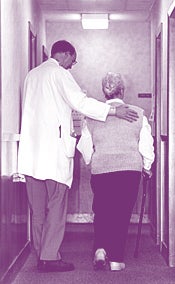Frail stay well thanks to program
GREENVILLE, N.C. (Dec. 14, 2001) — Study results show that a case-management program has sharply reduced doctor visits, trips to emergency department, hospital admissions and the cost of care for some of Pitt County’s most vulnerable senior citizens.
Dr. Kenneth Steinweg, a geriatrician and associate professor of family medicine at the Brody School of Medicine at East Carolina University, said preliminary results of the three-year study are dramatic.

Photo by Jean White.
“We have had 61 percent fewer emergency department visits with 41 percent less costs for those enrolled in the program,” Steinweg said. “We also found that there were 91 percent fewer hospital admissions and 92 percent less inpatient costs after enrollment. Total hospital costs have been reduced 84 percent as a result of the services we provide within the frail elderly program.”
The two-year-old Community-Based Case Management Program for the Frail Elderly was designed to keep those enrolled in the program out of nursing homes as well as keep them healthy without unnecessary doctor or emergency department visits.
With three years of funding provided by The Duke Endowment, case management and telemedicine services have been established for some elderly Pitt County residents living at home or in one of the following five assisted-living facilities: Alterra Sterling House, Carolina House, Spring Arbor, Cypress Glen and Oak Haven. Seniors enrolled in the program are assigned a nurse case manager, who becomes the eyes and ears of the patient and reports any potential changes in patient condition to the doctor. They know each patient”s medical history and what medication each is taking in order to provide the most comprehensive care possible. The physician and case manager can communicate instantaneously using an electronic medical record. Enrollees are considered frail elderly because they have an array of medical conditions that impair their activities of daily living. On average, the patients are 81, typically female, with eight medical conditions and are taking 12 medications. In 1998, more than 12,000 residents in Pitt County were over 65, and 10 to 20 percent of these could be described as “frail.”
Since it is difficult for these patients to get to a doctor, the doctor comes to them via telemedicine units. Not only do these devices check their vital signs and heart and lung performance, they also allow the physician or case manager to carry on a “face-to-face” conversation with the patient.
“It is very effective because the monitoring system can help us assess even subtle changes in the condition of a patient,” said Steinweg. “Among other things, we can detect the early stages of heart failure and heart disease, which is currently the biggest and most life-threatening problem facing the elderly. We can intervene earlier if we see a problem.”
The first two years of the study have been so successful that many hope the positive results will help set a precedent for establishing a permanent program to meet the needs of an ever-growing older population.
“The program has definitely benefited the patients and the hospital,” said Cheryl Duke, one of the two nurse case managers for the project. “We have been able to improve or maintain quality of life for many of our enrollees while preventing some trips to the emergency department and potential hospitalizations.”
Terry Hurdle, executive director of Alterra Sterling House, agreed that the program has worked well and credits much of its success to Duke and the other nurse case manager, Andrea Buck.
“Cheryl and Andrea know the medical histories and can get us quicker access to physicians,” said Hurdle. “They give quicker feedback and a quicker turnaround time for prescription refills.”